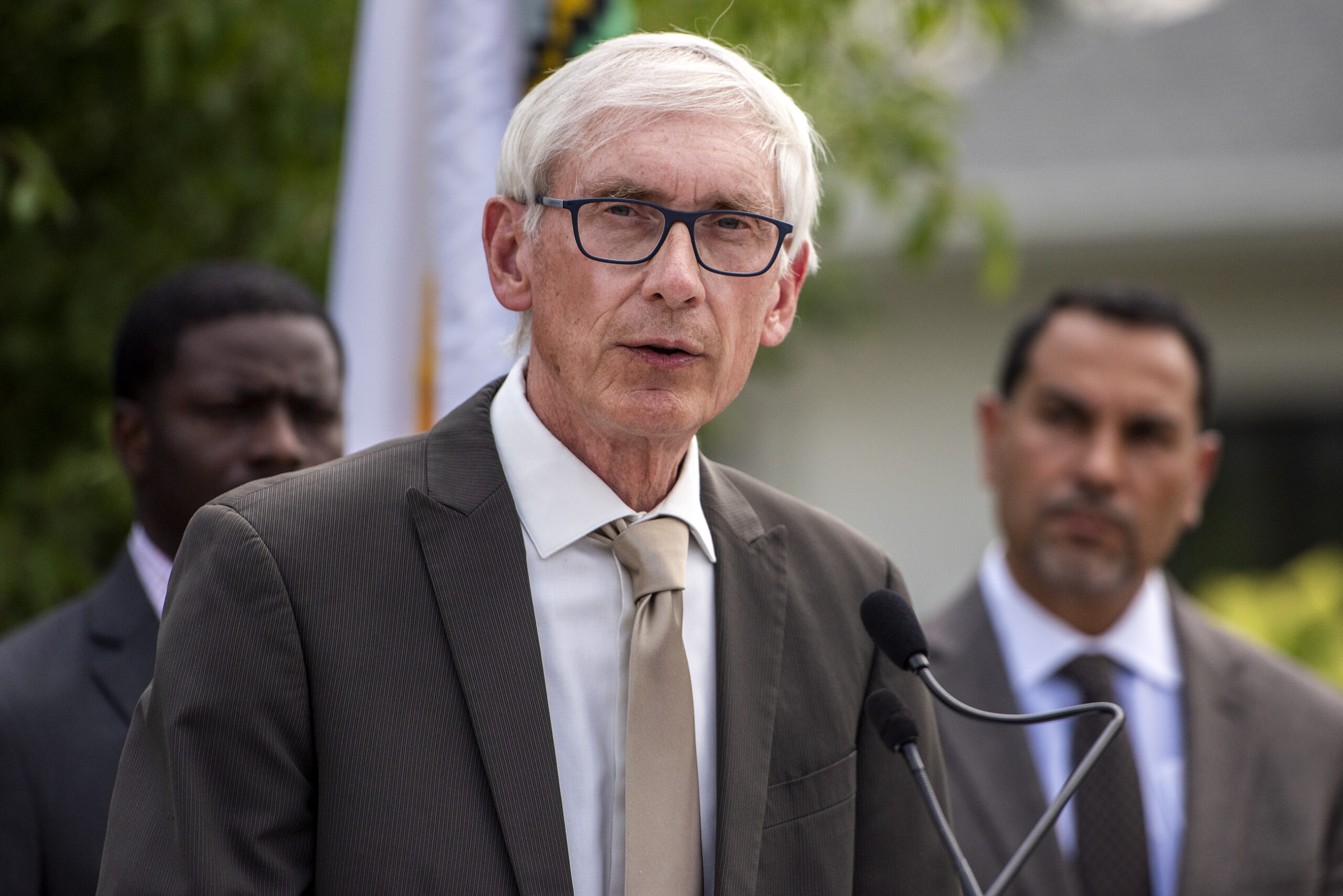Gov. Tony Evers vetoed six Republican-backed bills on Tuesday that would have changed election laws in Wisconsin, saying the proposals would have put up too many additional barriers to voting.
The bills were part of a package of 10 proposals unveiled in February that were largely in response to Republican criticism of how the 2020 election was administered in Wisconsin. They passed the Legislature in June on party-line votes, with Republicans voting in favor and Democrats against.
Speaking at a Capitol press conference on Tuesday morning, Evers said the bills would add “unnecessary and damaging hurdles for Wisconsinites to participate in our democracy.”
News with a little more humanity
WPR’s “Wisconsin Today” newsletter keeps you connected to the state you love without feeling overwhelmed. No paywall. No agenda. No corporate filter.
“As long as I’m governor of this great state, anti-democracy efforts like this will never see the light of day,” he said.
One of the bills would have ended a photo ID exemption for indefinitely confined voters in Wisconsin. Under state law, an indefinitely confined voter is defined as someone who is “confined because of age, physical illness or infirmity or is disabled for an indefinite period.” Current law allows voters to identify themselves as such by “signing a statement to that effect.” It also allows these voters to provide a witness signature as proof of their identity for purposes of voting, rather than a copy of their photo ID. Disability advocates have argued the exemption is necessary for many indefinitely confined voters.
Jenny Neugart, who works with Disability Vote Coalition, a statewide non-partisan advocacy group, said the proposal, along with others vetoed by Evers on Tuesday, would “significantly restrict” voters with disabilities.
“Voters with disabilities already have numerous barriers to voting, including lack of transportation, polling places that are inaccessible, complex medical conditions, difficulty obtaining a photo ID, less access to technology and the internet and more,” Neugart said at the Tuesday press conference.
Republicans backed the change because they believed people took advantage of the law during the COVID-19 pandemic, using it as a way to skirt the state’s voter ID requirement.
Neugart also expressed specific concern with a bill that would have limited who could return an absentee ballot on behalf of someone else. Under the proposal, only a voter, the voter’s legal guardian, a member of the voter’s immediate family, or another individual designated in writing may deliver an absentee ballot on behalf of a voter. The designated individual could not be a candidate for office, compensated for their work or deliver more than two ballots for non-immediate family members.
Another bill would have limited the period of time an indefinitely confined voter could automatically receive absentee ballots to one year. Current law allows that to happen for an indefinite period of time.
Other bills vetoed by Evers on Tuesday would have:
- Made it a felony to falsely represent yourself as indefinitely confined or falsely affirm someone else’s indefinitely confined status.
- Limited communities to a single site outside the clerk’s office for absentee ballot drop-offs.
- Barred the Wisconsin Elections Commission from automatically sending absentee ballot applications or absentee ballots to voters.
- Required clerks to post hourly updates with absentee voting statistics on the evening of Election Day.
- Required administrators at nursing homes and assisted living facilities to notify families when certified voting assistants will visit their facility to help residents with voting.
- Made it a felony for nursing home or assisted living facility staff to “influence” a resident’s voting behavior.
- Required observation areas for recounts to be no more than 3 feet from the area where ballots and other materials are being examined.
- Barred election officials from adding missing information to absentee ballot envelopes, even if they are able to get the information from official state documents.
- Required communities that provide live broadcasts of election proceedings to keep the recordings on file for at least 22 months.
Republicans were quick to push back on the governor’s vetoes. In a prepared statement, Assembly Speaker Robin Vos, R-Rochester, said Evers’ moves were a “momentous mistake.”
“These bills closed loopholes, standardized procedures, established uniformity, guaranteed only the voter can correct their own ballot and protected votes of seniors in long-term care,” Vos said.
Senate Majority Leader Devin LeMahieu, R-Oostburg, also issued a statement saying the governor “showed he’s committed to keeping the same laws and loopholes that were exploited during the pandemic.”
“Protecting Voter ID laws and the integrity of our election is fundamental to a healthy republic,” LeMahieu said. “Governor Evers is standing in the way of restoring the trust in our process that has been lost.”
Sen. Duey Stroebel, R-Saukville, who sponsored three of the vetoed bills, accused the governor of playing to his political base with the vetoes.
“I am frustrated but not surprised Governor Evers ignored lessons we learned from 2020 to play to his base,” Stroebel said. “It is now crystal clear to all Wisconsinites who wants to pursue common sense election integrity measures and who does not.”
Wisconsin Public Radio, © Copyright 2025, Board of Regents of the University of Wisconsin System and Wisconsin Educational Communications Board.







